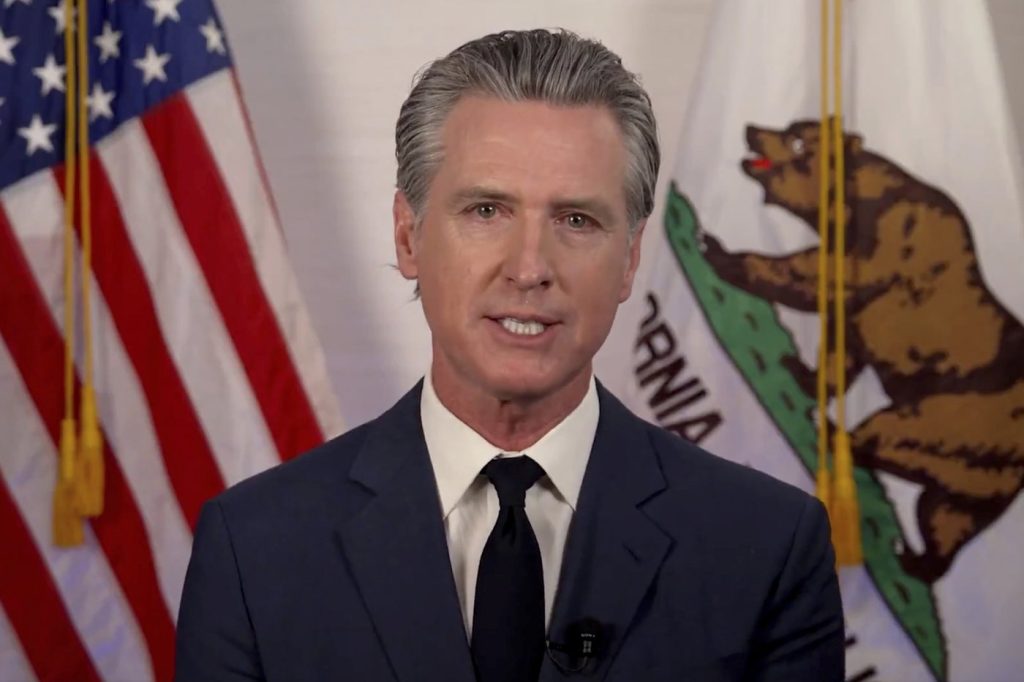LOS ANGELES (AP) – In a recent speech, Governor Gavin Newsom of California strongly criticized President Donald Trump, characterizing him as a threat to American democracy. Newsom's remarks came in the context of a federal military intervention in Los Angeles, which he argued was part of a broader strategy by Trump to undermine political and cultural norms vital to the nation’s democratic foundations. Newsom's speech took place on Tuesday evening, where he warned that the deployment of National Guard and Marine troops in the city was not merely a response to protests following federal immigration raids, but a calculated effort to consolidate power within the White House.
Newsom stated, “California may be first, but it clearly will not end here. Other states are next,” emphasizing the potential for similar actions across the nation. He depicted the current moment as a significant threat to democracy, asserting that it was under direct assault. Newsom, who may run for the Democratic presidential nomination in 2028, positioned himself as a leader of the anti-Trump resistance, presenting the military intervention as an alarming trend toward the erosion of democratic safeguards that have been in place since the country's founding.
In his speech, Newsom declared, “He’s declared a war. A war on culture, on history, on science, on knowledge itself.” He accused Trump of delegitimizing news organizations and assaulting First Amendment rights, as well as attacking law firms and the judicial branch, which he claimed are foundational to a civilized society. The Governor called for unified resistance, urging peaceful protests and warning against complicity in what he described as Trump's authoritarian aspirations. “What Donald Trump wants most is your fealty, your silence,” he cautioned. “Do not give in to him.”
This address coincided with Newsom's request to a court for an emergency order to halt military assistance to federal immigration agents, with National Guard troops having been deployed in a supportive role during arrests. Though the Trump administration had mobilized over 4,000 National Guard members and 700 Marines, the military presence had thus far seen limited engagement with protests, being initially sent to protect federal properties.
The speech marked a culmination of heated exchanges between Trump and Newsom, with Trump suggesting that Newsom might face arrest if he interfered with federal immigration enforcement. “I think it’s great. Gavin likes the publicity, but I think it would be a great thing,” Trump remarked. Over the years, Trump has publicly criticized Newsom over various issues, including the homelessness crisis in California and the management of wildfires in Southern California.
Amid this contentious backdrop, Trump has often referred to Newsom with derogatory nicknames and has described the situation in Los Angeles as a city at risk of being overwhelmed by violent protests. Conversely, Newsom and Los Angeles Mayor Karen Bass have labeled the federal intervention unnecessary and a potential source of danger.
Protests have primarily been concentrated in downtown Los Angeles but have spread to other cities across the nation, including Dallas, Austin, Chicago, and New York City, where crowds have gathered and multiple arrests were made. Trump has left the option open of invoking the Insurrection Act, granting him the power to deploy military forces domestically in reaction to rebellion or civil disorder. “If there’s an insurrection, I would certainly invoke it. We’ll see,” he stated from the Oval Office.










